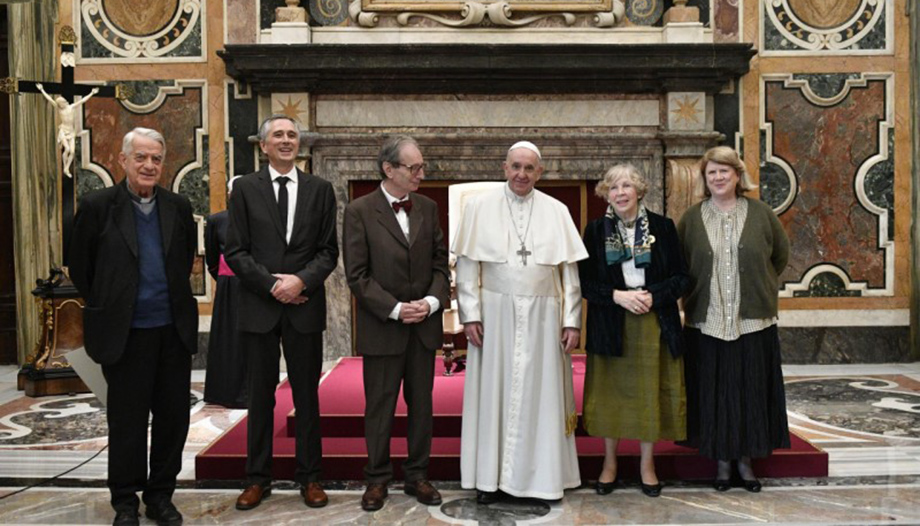Pope Francis first greeted this year's laureates. They are Professor Hanna-Barbara Gerl-Falkovitz, Professor Emeritus of Philosophy of Religions and Comparative Religious Studies at the University of Dresden, a leading specialist in Edith Stein and Romano Guardini. Ludger Schwienhorst-Schönberger, professor of Old Testament at the University of Vienna and considered one of the leading experts on the Wisdom Books and, in particular, on the Song of Songs.
The same affectionate greeting was addressed by the Holy Father to the French philosopher and theologian Jean-Luc Marion, professor of Metaphysics at the Sorbonne and academician of France, and to the Australian professor Tracey Rowland, an expert on the relationship between 20th century theology and culture. Both were awarded in 2020, and have now received their award along with the 2021 winners, from the hands of the Pope.
Tracey Rowland holds a professorship at the University of Notre Dame, Australia, and is a member of the editorial board of the magazine Communio. In addition, he has been a speaker at a Forum organized by Omnes on April 14, 2021, led by the professor of the University of Navarra, Pablo Blanco, with the title. Contemporary theology and culture.
The Pope pointed out that the Ratzinger Foundation's prize initiative has established a "lasting bond" between the Church and the world of culture. Because it is noted that the community of prizewinners grows every year in number, origin and variety of disciplines. The capacity of the human mind, he added, "is the effect of the 'spark' lit by God in the person made in his image," which continually impels him "to express the vitality of the spirit in the shaping and transfiguration of matter."
"Scripture speaks to us of God's creation as a 'work,'" the Holy Father added. "For this reason, we pay homage not only to the depth of thought and writings, or to the beauty of artistic works, but also to the work done with generosity and passion over many years to enrich the immense human and spiritual patrimony to be shared. It is an invaluable service for the elevation of the spirit and dignity of the person, for the quality of relationships in the human community and for the fruitfulness of the Church's mission".
Eulogy of Pope Emeritus Benedict XVI
In his speech, the Roman Pontiff referred to the personalities who were the object of research by the award winners, citing among others Guardini, De Lubac, Edith Stein, Lévinas, Ricoeur and Derrida, as well as McIntyre. He then affirmed: "Among these masters we must count a theologian who knew how to open and nourish his reflection and his cultural dialogue towards all these directions together, because faith and the Church live in our time and are friends of every search for truth. I am speaking of Joseph Ratzinger".
It is "the occasion to address to him once again our affectionate, grateful and admiring thoughts," he added, while recalling their meeting a few months ago on the occasion of the 70th anniversary of his ordination to the priesthood: "...we feel that he accompanies us in prayer, keeping his gaze constantly turned towards the horizon of God. Today we thank him, in particular, because he was also an example of passionate dedication to study, research, written and oral communication; and because he always fully and harmoniously united his cultural research with his faith and his service to the Church".
The Pope underscored this commitment to study and writing, which he continued during his pontificate to complete the trilogy on Jesus "and thus leave us a unique personal testimony of his constant search for the face of the Lord." From his search, he noted, we feel "inspired and encouraged, and we assure him of our remembrance of the Lord."
Cooperators of the truth
Francis also referred to the motto chosen by the then Archbishop Joseph Ratzinger in Munich: co-operators of the truth: 'cooperatores veritatis', are the motto he chose when he became Archbishop of Munich. They express the common thread of the different stages of his life, from his studies to his academic teaching, through his episcopal ministry, his service for the Doctrine of the Faith ̶ to which he was called by St. John Paul II 40 years ago ̶ and his pontificate, characterized by a luminous magisterium and an unfailing love for the Truth.
The slogan "cooperatores veritatis" continues to inspire the commitment of the scholars awarded by the Ratzinger Foundation. Pope Francis affirmed that these words "can and must inspire each of us in our activities and in our lives."








